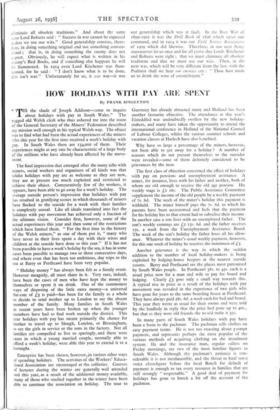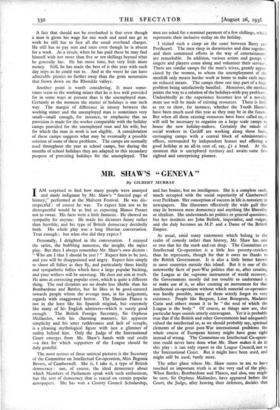HOW HOLIDAYS WITH PAY ARE SPENT
By FRANK SINGLETON
" the shade of Joseph Addison—come to inquire 1, about holidays with pay in South Wales." The rugged old .Welsh clerk who thus ushered me into the room of the General Secretary of the Miners' Federation described my mission well enough in his typical Welsh way. The object was to find what had been the actual experiences of the miners who this year for the first time received a week's holiday with pay. In South Wales there are 134,000 of them. Their experiences might at any rate be characteristic of a large body of the millions who have already been affected by the move- ment.
The final impression that emerged after the many talks with miners, social workers• and organisers of all kinds was that whilst holidays with pay are as welcome as they are new, they are at present too much exploited and restricted to achieve their object. Comparatively few of the workers, it appears, have been able to go away for a week's holiday. The average outside person's impression that holidays with pay has resulted in gratifying scenes in which thousands of miners have flocked to the seaside for a week with their families is completely, unreal. Like all ideals translated into fact the holidays with pay movement has achieved only a fraction of the ultimate vision. Consider first, however, some of the actual -experiences this year and then some of the restrictions which have limited them. " For the first time in the history of the Welsh miners," as one of them put it, " many who have never in their lives spent a day with their wives and children at the seaside have done so this year." If it has not been possible to have a week's holiday by the sea, it has in some cases been possible to manage two or three consecutive days, and where even that has been too ambitious, day trips to the sea at Barry or Porthcawl have been very popular.
" Holiday money " has always been felt as a family event. However meagrely, all must share in it. Very rare, indeed, have been the cases of men who have kept the money to themselves or spent it on drink. One of the commonest ways of disposing of the little extra money—a universal flat-rate of £3 is paid—has been for the family as a whole to decide to send mother up to London to see the absent member of the family. Many families in South Wales in recent years have been broken up when the younger members have had to find work outside the district. This year holidays with pay has meant primarily the chance for mother to travel up to Slough, London, or Birmingham, to see the girls in service or the sons in the factory. Not all families are compelled to live so sparingly, and there were cases in which a young married couple, normally able to afford a week's holiday, were able this year to extend it to a fortnight.
Enterprise has been shown, however,.in various other ways of spending holidays. The activities of the Workers' Educa- tional Association are encouraged at the collieries. Courses of lectures during the winter are generally well attended and this year, as a result of the additional money available, many of those who studied together in the winter have been able to continue the association on holiday. The tour to Guernsey has already attracted many and Holland has been another favourite objective. The attendance at this year's Eisteddfod was undoubtedly swollen by the new holiday- makers, and many have taken the opportunity to attend the international conference in Holland of the National Council of Labour Colleges, whilst the various summer schools and vacation classes at Harlech have also benefited.
Why have so large a percentage of the miners, however, not been able to get away for a holiday ? A number of reasons which do not present themselves to the outsider were revealed—some of them definitely considered to be grievances by the men.
The first class of objection concerned the effect of holidays with pay on pensions and unemployment assistance. A miner, for instance, lives with his father and mother, both of whom are old enough to receive the old age pension. His weekly wage is £2 16s. The Public Assistance Committee supplement the income of the old people by a weekly payment of 75. 6d. The week of the miner's holiday this payment is withheld. The miner himself pays the 7s. 6d. to which his parents have been accustomed and feels that the payment for his holiday has to that extent had to subsidise their income. In another case a son lives with an unemployed father. The son's weekly earnings are £2 13s. 6d. and the father receives 15s. a week from the Unemployment Assistance Board. The week of the son's holiday the father loses all his allow- ance. Whatever the miner's usual weekly payment, however, for this one week of holiday he receives the maximum of £3.
Another grievance is the way in which the sudden addition to the number of local holiday-makers is being exploited by lodging-house keepers at the nearest seaside resorts. Barry and Porthcawl are the places most patronised by South Wales people. In Porthcawl 38s. to 45s. each is a usual price now for a man and wife to pay for board and lodging. Clearly £3 goes only a small way towards this. A typical rise in price as a result of the holidays with pay movement was revealed in the experience of two girls who have gone for years to the same boarding house at Porthcawl. They have always paid 28s. 6d. a week each for bed and board. This year they wrote as usual for their rooms and were told by the landlady in reply that the price had gone up to 4os., but that as they were old friends she wculd make it 35s.
In many parts of South Wales holidays with pay have been a boon to the packman. The packman sells clothes on easy payment terms. He is not too exacting about prompt payment, and represents perhaps 'the most popular of the various methods of acquiring clothing on the instalment system. He and the insurance man, regular callers on Friday mornings, are two of the most familiar figures in South Wales. Although the packman's patience is con- siderable it is not inexhaustible, and the threat to haul some strict churchgoer before the local Bench for default of payment is enough to tax every resource in families that are still strongly " respectable." A good deal of payment for holidays has gone to knock a bit off the account of the packman. A fact that should not be overlooked is that even though a man is given his wage for one week and need not go to work he still has to face all the usual overhead charges. He still has to pay rent and rates even though he is, absent for a week. As a result, when he has paid these he may find himself with not more than five or ten shillings beyond what he generally has. He has more time, but very little more money. Still, he has made the best of it this year with such day trips as he could run to. And at the worst he can have admirable picnics no farther away than the grim mountains that frown down on the Rhondda valleys.
Another point is worth considering. It must some- times seem to the working miner that he is less well provided for in some ways at present than is the unemployed man Certainly at the moment the matter of holidays is one such way. The margin of difference in money between the working miner and the unemployed man is sometimes very small—small enough, for instance, to emphasise that no provision is made for the worker comparable with the holiday camps provided for the unemployed man and his wife, but for which the man in work is not eligible. A consideration of these camps suggests' what may be eventually a possible solution of some of these problems. The camps are normally used throughout the year as school camps, but during the months of school holidays they are adapted to this secondary purpose of providing holidays for the unemployed. The men are asked for a nominal payment of a few shillings, which represents their inclusive outlay on the holiday.
I visited such a camp on the coast between Barry and Porthcawl. The men sleep in dormitories and dine together, and their communal efforts in the way of entertainments are remarkable. In addition, various artists and groups of singers and players come along and volunteer their services. There are similar camps for the men's wives, greatly appre- ciated by the women, to whom the unemployment of the menfolk only means harder work at home to make ends meet on reduced means. The camps show one tiny part of a huge problem being satisfactorily handled. Moreover, the method points the way to a solution of the holidays-with-pay problems. Undoubtedly as the experience becomes-less of a novelty more use will be made of existing resources. There is little as yet to show, for instance, whether the Youth Hostels have been much used this year as they may be in the future. But when all these existing resources have been called on, it will still be necessary to organise on a large scale camps to house the new holiday-makers. Certainly the minds of social workers in Cardiff are working along those lines, envisaging camps with a central block of administrative offices, surrounded by independent houses and offering a good holiday at an all-in cost of, say, kr a head. At the moment this is unexplored territory and awaits some far- sighted and enterprising pioneer.



































 Previous page
Previous page